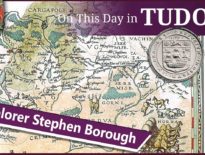On this day in Tudor history, 24th September 1589, Roman Catholic priest, William Spenser, and layman Robert Hardesty were executed at York. Spenser was executed for being a priest, and Hardesty for sheltering Spenser.
The two men were beatified in 1987 as two of the Eight-five Martyrs of England and Wales.
Find out more about William Spenser and Robert Hardesty, and how they came to their awful ends, in today's talk.
Also on this day in Tudor history, 24th September 1486, Arthur Tudor, Prince of Wales and son of Henry VII and Elizabeth of York, was christened at a lavish ceremony at Winchester Cathedral. His mother's confinement, his birth, his christening and early upbringing had all been carefully 'choreographed' by his paternal grandmother, Lady Margaret Beaufort, and I shared details in last year’s video:
Also on this day in history:
- 1516 – Birth of Richard Pate, lawyer, member of Parliament and refounder of Cheltenham Grammar School, now known as Pate's Grammar School.
- 1526 – Sometime before 24th September 1526, Marmaduke Huby, Abbot of Fountains since 1495, died at around the age of 87. It is thought that he was buried under the floor of the chapter house.
- 1561 – Birth of Edward Seymour, Viscount Beauchamp, son of Katherine Grey (sister of Lady Jane Grey) and Edward Seymour, 1st Earl of Hertford, in the Tower of London. He was born in the Tower because his parents had been imprisoned for marrying without the Queen's permission.
- 1564 – Birth of William Adams, navigator, in Gillingham, Kent. He is thought to be the first Englishman to have reached Japan (arriving there in 1600) and was the inspiration for the character of John Blackthorne in the famous novel Shōgun.
Transcript:
On this day in Tudor history, 24th September 1589, Roman Catholic priest, William Spenser, and layman Robert Hardesty were executed at York. Spenser was executed for being a priest, and Hardesty for sheltering Spenser.
In his book “Acts of English martyrs”, John Hungerford Pollen, writes that William Spenser was born in Gisburn in Yorkshire and that he was educated at Trinity College, Oxford, supported by his uncle William Horn. There he was a scholar and fellow, and graduated MA in 1580. Pollen states that he met Spenser at Oxford, writing:
“There I knew him for about eight years, always leading a most upright life, but suffering much at the hands of the heretics even before he left the university, because he was looked on as leaning somewhat towards the Catholic faith. They brought many charges against him, and he would argue against them, but never recklessly. From the time he was a boy his zeal for souls was marvellous, and he never neglected the first rudiments of faith taught him by his uncles, but acted up to them with zeal and constancy to the time of his death.”
In 1582, Spenser was a member of a group of men who travelled to the Jesuit College at Reims, to study “cases of conscience, Holy Scripture, and controversy” and to get ready to travel back to England to ‘harvest’ souls for the Catholic faith. After two years in Reims, he was ordained as a priest and returned to England. Pollen writes of how Spenser worked so “earnestly in order to help souls” that he voluntarily made himself a prisoner at York Prison so that he could save the prisoners there.
Spenser was apprehended while on a journey by a justice who was out hunting, and recognised as “some Papist or seminary priest”. He was condemned under the Elizabethan Act against Jesuits, seminary priests, and such other like disobedient persons for being a priest. Pollen writes that “he answered at the bar with intrepidity, and met his death with joy”.
In his work “Examination of Fox’s Calendar of Protestant Saints, Martyrs”, William Eusebius Andrews writes that Spenser was sent on a mission to England in 1584 but that “The particulars of his labours and sufferings are not known, only that he was apprehended, tried and condemned for receiving holy orders beyond the seas, by authority derived from the bishop of Rome, and coming over to England, and there exercising his priestly functions.” He goes on to say that “He received the sentence of death with an undaunted courage, and suffered with great constancy, being hanged, drawn and quartered at York, the 24th of September, 1589.”
He adds that Robert Hardesty “a layman of great probity and piety” was hanged with him “for having harboured and relieved the confessor of Christ, knowing him to be a priest.”
Spenser and Hardesty were beatified in 1987 by Pope John Paul II as two of the Eighty-five Martyrs of England and Wales who were killed between 1584 and 1679.



Leave a Reply